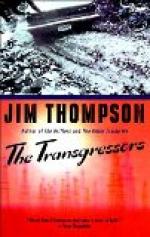Cyrus Fielding, the delegate representing the federation of stone masons, is recognized by the chair.
Fielding is a man of short stature, his eyes betray a lacklustre that might be the result of over-indulgence in liquor or want of rest; he is thin and poorly clad, his face is cleanly shaven. At every pause in his speech he runs his fingers through his thick dishevelled black hair, and finishes this mannerism with wiping his forehead with the back of his hand. His delivery is awkward and these repeated movements intensify this awkwardness.
“I have a grievance against the Trusts that dates back as far as my birth. I never had a fair start. My father was a victim of the power of gold and I inherited his misfortune.
“My first work was as a helper in the great Pennsylvania Iron Trust’s works that are owned by that old man, the self-styled philanthropist, Ephraim Barnaby, a hypocrite of the first water, who goes about the world asking people how he can best dispose of his fabulous fortune.
“From the rank of helper I soon rose to the position of foreman of the moulding shop. This was a most important place and I felt proud that I had attained it in so short a period as three years.
“It was my ambition to learn all I could relating to the work in the iron industry. Toward this end I spent four hours every night in reading and experimenting. At the end of another three years I had a fund of knowledge that put me in the front rank as a constructing engineer.
“But I was not a graduate of a college of engineering, so I could not get the degree. The opportunity of utilizing my practical knowledge by forming a competing company was closed by the bar of traffic rates.
“My employers advanced me to the rank of superintendent of the shops in the largest iron manufacturing city in the state. I had to be satisfied with a position under the iron masters.
“Then came the memorable strike that led to the killing of the men by the paid detectives of the Iron Masters.
“The claims of the men were just, and as a man I could not side against them. I put my fortune in with them. The details of the strike are known to you all. The story of the shooting of unarmed mill hands at the instance of the mill owners will never be forgotten; it has marked an era in the history of this country.
“Well, I was a conspicuous figure in those days. The strikers hailed me as a champion; the mill owners first sought to win me over; then they contrived to do away with me. Three times I was assaulted by murderous men who had been hired to kill me.
“When their schemes of violence failed they resorted to the most effective method of destroying me. They discharged me and refused to let me return after the strike was declared off. Not satisfied with having turned me away from their mills they dogged my every step. Since that day I have been unable to get employment in any mill in this country.




